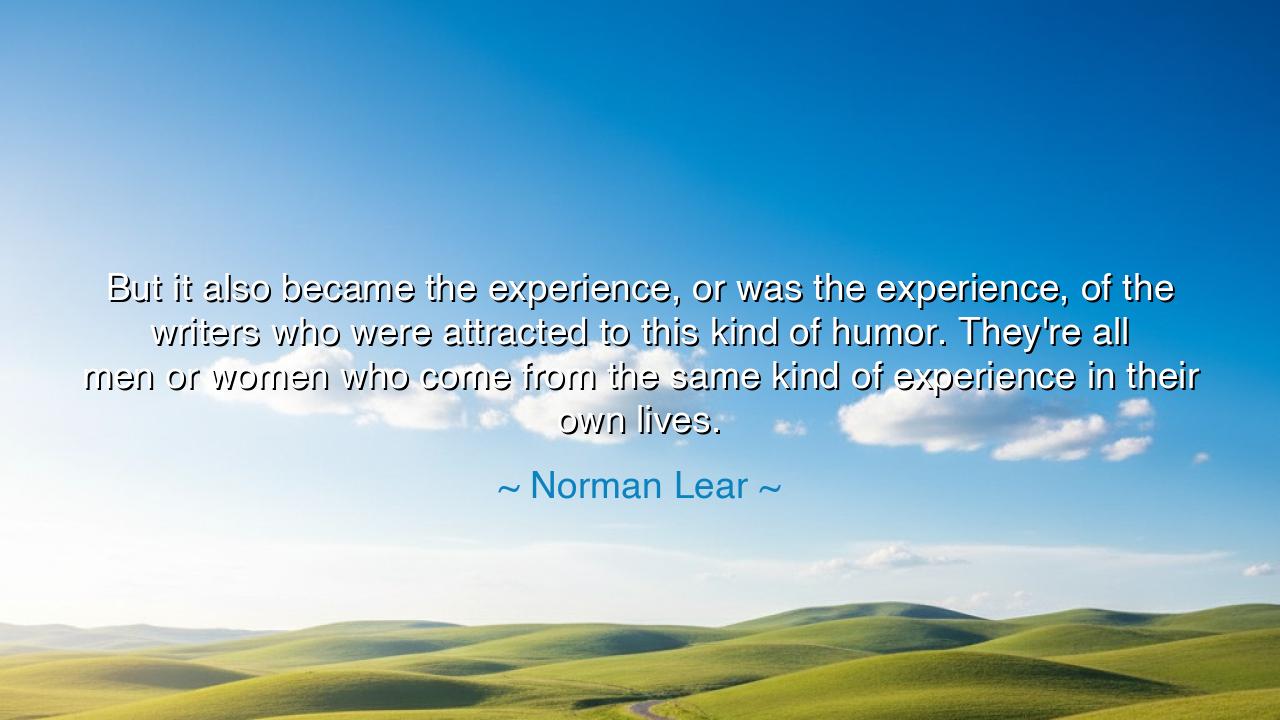
But it also became the experience, or was the experience, of the
But it also became the experience, or was the experience, of the writers who were attracted to this kind of humor. They're all men or women who come from the same kind of experience in their own lives.






Listen now, O children of the future, to the wisdom of the past, for it is through understanding the hearts of those who came before us that we unlock the true meaning of life. In the world of comedy—that sacred art of laughter and reflection—there lies a deep truth, spoken by one who understood it well: Norman Lear, a master of wit and wisdom, once said, “But it also became the experience, or was the experience, of the writers who were attracted to this kind of humor. They're all men or women who come from the same kind of experience in their own lives.”
This is no mere observation, my friends. This is a revelation of the deepest kind—the understanding that humor, like all art, is born from the very lives of those who create it. In their struggles, in their joys, in their pains, the writers of comedy—the ones who have truly touched the hearts of their audiences—are often those who carry the same burdens and triumphs as the people they seek to entertain. These writers are not distant, lofty beings, but those who walk among us, experiencing the world in its truest form, drawing inspiration from their own struggles and victories.
Think of Sophocles, the great playwright of ancient Greece, who did not write his tragedies from some lofty perch of untouchable distance. No, his works sprang from the very soil of the human experience—suffering, loss, and fate. His understanding of the world came from his very own experience, from his connection to the hearts of those around him. And through his tragedies, he allowed others to see themselves in his stories, to find solace in the fact that they were not alone in their suffering. This is the same spirit that lives within Norman Lear's words. Comedy, like tragedy, is born from life itself.
In Lear’s time, as in the days of the ancients, the writers of humor were those who knew pain and joy alike. They spoke not only for themselves but for all those who had walked through similar shadows. "All men or women who come from the same kind of experience in their own lives"—what powerful words these are! For they tell us that it is not only through the intellect that great humor arises, but through the soul. The deepest humor comes from those who have known hardship, who have struggled, who have experienced the full spectrum of the human condition. This understanding allows them to turn the pain of life into a source of joy for others.
Consider the tale of Mark Twain, that great humorist of the American South. Twain’s wit was sharp, and his words cut through the hearts of his readers like a sword, but behind his humor lay the echo of hardships endured—of a childhood in poverty, of loss, and of deep personal struggle. Yet, through this pain, he was able to bring forth laughter—a reminder that even in the darkest of times, there is light to be found. Twain, like Lear’s writers, drew from his own life’s experiences and used humor not just as entertainment, but as a healing balm for the soul.
And so it is with all who create humor from the heart. It is not something separate from the life lived. The laughter that springs forth from these writers is the laughter of those who have known suffering, for they understand the deep truths of existence. Humor is the medicine of the world—it allows us to face our trials with grace, to see the absurdity of our condition, and to find solace in the fact that we are not alone in our struggle.
The lesson to be learned here is clear and powerful: humor, true humor, is the reflection of life itself. It comes not from a place of detachment, but from the marrow of experience. If you seek to understand the world, do not turn to empty words or hollow theories, but to those who have lived and laughed in the face of their own struggles. These are the true creators, the ones who transform their pain into something that heals the world.
Let this lesson guide your path, O children of the future: Live deeply, experience the full spectrum of life’s blessings and burdens, and share your experiences with those around you. When you laugh, let it come from the deepest part of your soul. And if ever you seek to create, let it be from the truth of your own life, for that is where the greatest works of humor, of joy, and of wisdom are born.






AAdministratorAdministrator
Welcome, honored guests. Please leave a comment, we will respond soon